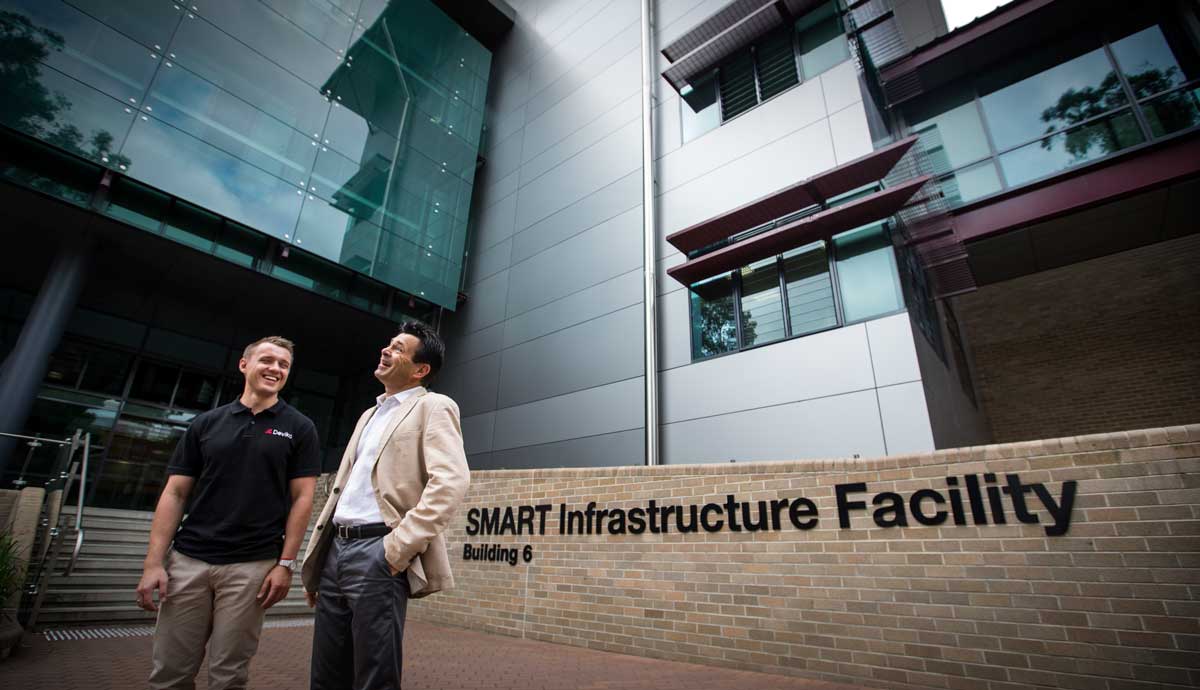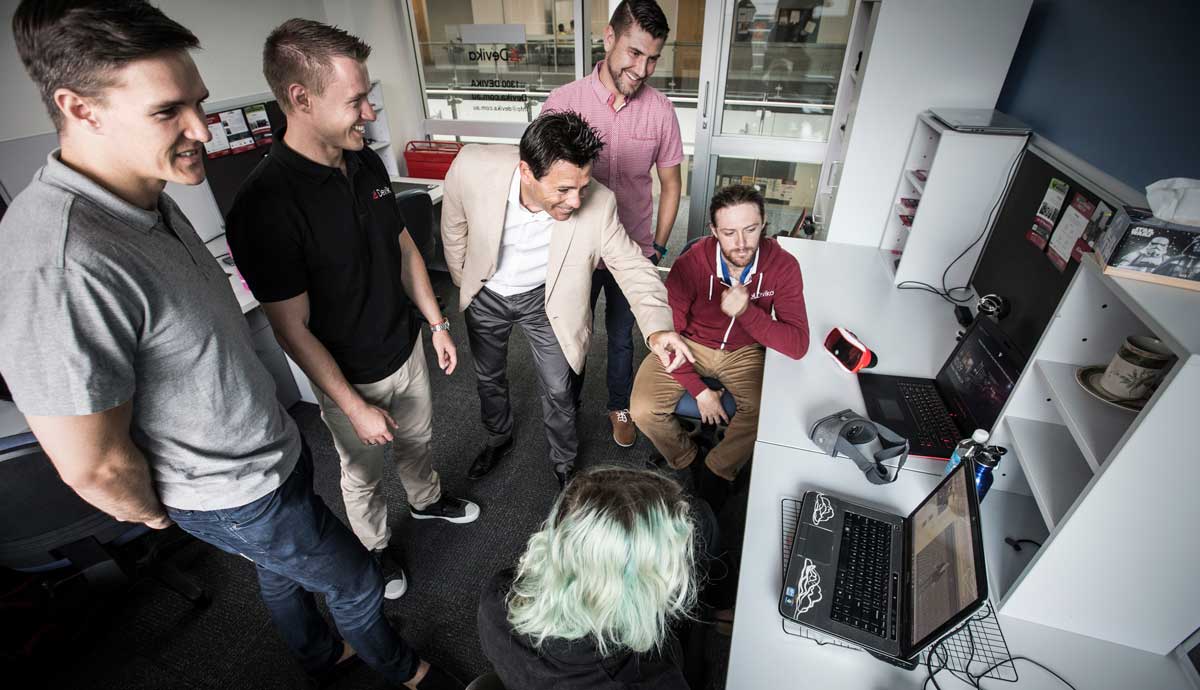March 1, 2017
Virtual infrastructure closer to reality in SMART partnership
A partnership between the University of Wollongong's (UOW) SMART Infrastructure Facility and technology startup Devika will unleash opportunities to use virtual reality in urban planning, community engagement and teaching and learning.
Virtual reality takes technology typically used in gaming, and using an enclosed headset, immerses the viewer in a virtual world.
Hand controllers allow the user to interact with objects or move around in the virtual space.
Already the technology has been used in education, gaming, movies, virtual tours, architecture and a host of other applications.
SMART Director Professor Pascal Perez said Devika Works brought critical know-how in virtual reality and artificial intelligence that will enhance SMART’s research capability.
“This is a genuine research and development collaboration that puts a local company that is at the cutting-edge of virtual reality and artificial intelligence alongside researchers and students who are working on critical infrastructure and urban planning issues,” Professor Perez said.
Professor Perez said SMART first investigated virtual reality through its partnership with Mines Rescue Ltd, which uses an immersive, cinema-like training environment for underground mine workers.
“Our study confirmed the high potential of VR-based training for workers who have to collectively face high risk environments, regardless of their previous experience with modern technologies.
“The evaluation framework developed by our PhD student, Ms Shiva Pedram, has a strong potential to be adapted to other high risk industries.
"So, it is great to work directly with Devika on creating training content for other applications.”
 A partnership between SMART and Devika Works will bring critical know-how in virtual reality and artificial intelligence that will enhance SMART’s research capability.
A partnership between SMART and Devika Works will bring critical know-how in virtual reality and artificial intelligence that will enhance SMART’s research capability.
Other uses could include SMART’s transport, infrastructure and urban planning modelling and create immersive 3D models, as well as extending the modelling to change community consultation for the better.
"Up until now, the only option for community consultation on major projects has been to hold open days or put information in people's mailboxes.
"This time is over because people see it as token engagement and they feel their voices are not being heard.
“We know that we need to bring people on board from day one. If they can’t imagine how the infrastructure will look, how it will work, how it will impact them, we could use virtual reality to immerse them in the project.
“VR is perfect for that. They can see, they can interact, they can understand the different options and provide real and valuable feedback to the project management and political leaders.
"That’s how people will get on board and feel they are being included in very important decisions.”
Professor Perez said VR was also a powerful tool to spark interest in technology-related subjects in school students, and inspire more of them to take up science, technology, maths and engineering degrees in the future.
“Putting a 3D printer in front of students is nice but it doesn't really demonstrate the power of what it can do, or the connection between that tool and taking up coding, for example.
"Virtual reality can show context and how it all comes together on a much larger scale.”
UOW computer science student Thomas Higgins is working part-time with Devika on virtual reality projects as well as in their education team, teaching students coding for VR.
He’s working a visualisation of a mouse brain, integrating clinical scans with sophisticated coding to create an immersive, three-dimensional image that could be used in applications ranging from clinical diagnosis and treatment, virtual surgery for medical students, or helping researchers unravel biological complexity.
 VR-based training has potential for training workers to operate safely in high-risk environments.
VR-based training has potential for training workers to operate safely in high-risk environments.
Ken Kencevski, UOW alumnus and CEO of technology startup Devika, said the collaboration was an important part of developing new and appropriate products.
“For us it’s about accessibility to the right people. We’re technologists and we’re at the forefront of virtual reality and artificial intelligence but we need input from researchers in key fields,” Mr Kencevski said.
“For example, we’re developing a virtual reality application which is aimed at increasing the awareness of unconscious bias in an non-confrontational way, we want to work with psychologists to better understand that process.
"Or if we’re working on modelling a brain, we want to be able to work with neuroscientists and clinicians in the field to develop the best possible solution.
“Being connected with an education institution is also important because it’s a core part of what we do.
'VR creates opportunities for experiential learning. A student studying history could use a VR headset to immerse themselves in the Great Wall of China.”
Mr Kencevski said Wollongong had the potential to foster new and diverse industries.
“Think global from day one. Our first project was in New Jersey. We want people to know that you can launch a successful technology business here without having to move to Sydney or elsewhere.
“Wollongong is great city to launch a business and being linked with UOW will help us fulfil our goal of fostering the next generation of knowledge workers who can find work and develop ideas from right here in Wollongong.”
Associate Professor Robert Gorkin, who helped initiate the partnership after meeting DEVIKA at their 2016 Global Entrepreneur Week event, said the technology had the potential to change everything from healthcare to manufacturing.
“Virtual Reality goes well beyond consumer use and gaming, it is enabling new productivity for businesses.
"This partnership enhances Wollongong’s ability to strategically contribute in the sector. Devika are expanding globally and have been part of the startup landscape in Silicon Valley.
"It's critical we embrace leaders like Devika that can help drive innovation in the region.”
:format(jpg)/prod01/channel_3/assets/live-migration/www/images/content/groups/public/web/media/documents/mm/uow229158.jpg)